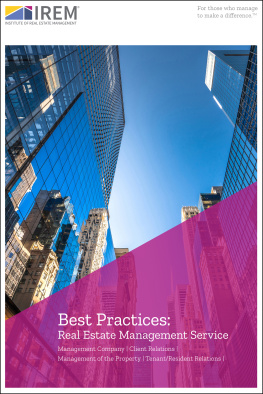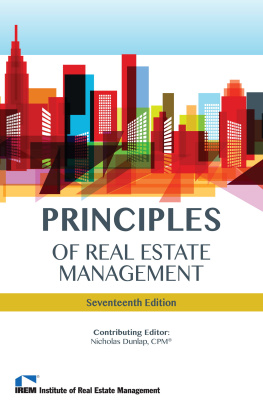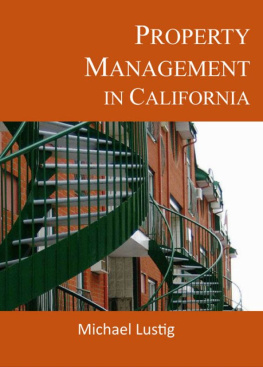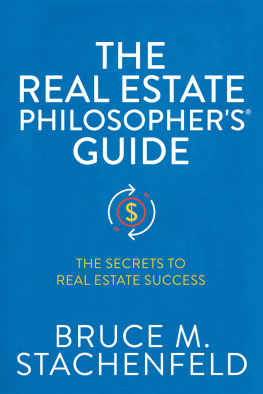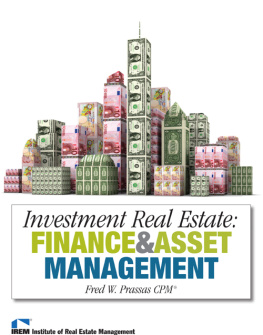Institute of Real Estate Management - Best Practices: Real Estate Management Service
Here you can read online Institute of Real Estate Management - Best Practices: Real Estate Management Service full text of the book (entire story) in english for free. Download pdf and epub, get meaning, cover and reviews about this ebook. year: 2020, publisher: Institute of Real Estate Management, genre: Business. Description of the work, (preface) as well as reviews are available. Best literature library LitArk.com created for fans of good reading and offers a wide selection of genres:
Romance novel
Science fiction
Adventure
Detective
Science
History
Home and family
Prose
Art
Politics
Computer
Non-fiction
Religion
Business
Children
Humor
Choose a favorite category and find really read worthwhile books. Enjoy immersion in the world of imagination, feel the emotions of the characters or learn something new for yourself, make an fascinating discovery.
- Book:Best Practices: Real Estate Management Service
- Author:
- Publisher:Institute of Real Estate Management
- Genre:
- Year:2020
- Rating:4 / 5
- Favourites:Add to favourites
- Your mark:
- 80
- 1
- 2
- 3
- 4
- 5
Best Practices: Real Estate Management Service: summary, description and annotation
We offer to read an annotation, description, summary or preface (depends on what the author of the book "Best Practices: Real Estate Management Service" wrote himself). If you haven't found the necessary information about the book — write in the comments, we will try to find it.
Institute of Real Estate Management: author's other books
Who wrote Best Practices: Real Estate Management Service? Find out the surname, the name of the author of the book and a list of all author's works by series.
Best Practices: Real Estate Management Service — read online for free the complete book (whole text) full work
Below is the text of the book, divided by pages. System saving the place of the last page read, allows you to conveniently read the book "Best Practices: Real Estate Management Service" online for free, without having to search again every time where you left off. Put a bookmark, and you can go to the page where you finished reading at any time.
Font size:
Interval:
Bookmark:
Best Practices: Real Estate Management Service
Management Company | Client Relations | Management of the Property | Tenant/Resident Relations
2020 by the Institute of Real Estate Management of the NATIONAL ASSOCIATION OF REALTORS
All rights reserved. This book or any part thereof may not be reproduced, stored in a retrieval system, or transmitted, in any form or by any means, electronic, mechanical, photocopying, recording, or otherwise, without the prior written permission of the publisher. Inquiries should be directed to Knowledge Solutions Team, Institute of Real Estate Management, 430 North Michigan Avenue, Chicago, IL 60611.
Disclaimer of legal liability
The Institute of Real Estate Management, including without limitation its officers, directors, employees, advisors, consultants, committee members, task force members, agents, volunteers and members (IREM), has assembled the material in this document for the sole and singular purpose of providing potential practices in real estate management service.
This publication or any part thereof does not, and is not intended to, create a standard of care for any real estate professional or property manager. This publication or any part thereof does not, and is not intended to, create any relationship of any kind whatsoever, or create any duty of care between IREM (or any of the persons or parties included in IREM as defined) and any other person or entity including any person or entity that may read, review, use or become aware of this publication or any part thereof.
The information is presented as is. IREM makes no express or implied representations, warranties, guarantees, or promises, that the information presented is current or accurate at any point in time, be it presently, previously, or at any time in the future.
Because of changing and varying national, state/province, and local laws and regulations, competent professional advice should be sought prior to the use of this publication and any related document, form, exhibit, or the like. This publication is sold with the understanding that the publisher is not engaged in rendering legal, accounting, or any other professional service. If legal advice or other expert assistance is required, the services of a competent professional should be sought.
ISBN-13: 978-1-57203-289-7
ISBN-10: 1-57203-289-8
Library of Congress Control Number: 2020949013
SKU: 785.20E
Learn more about IREM at irem.org.


IREM (Institute of Real Estate Management) has developed this set of best practices to serve as a practical tool for real estate management company executives in operating their businesses successfully and in a professional manner.
They have been developed with the goal of providing a reasonable framework for the professional delivery of real estate management services.
The concept behind these best practices is that there are certain proven solutions and recognized guidelines that are likely to result in greater efficiency, enhanced effectiveness, and ultimately a competitive advantage. These 62 best practice statements are explicitly not intended to be standards, but rather are guiding suggestions for those who provide real estate management services. They are aligned around four organizing categories :
- The management company
- Client relations
- Management of the property
- Tenant/resident relations
These best practices are focused on the management company or other business enterprise that is providing real estate management services to others not on the individual real estate manager or on the property being managed. These best practices tend to be more aligned with the management of rental properties and investment real estate, but they are equally applicable to and intended to be used for the management of all property types and properties of all sizes in all markets.
IREMs best practices can be used in several ways:
- As a business development tool. The best practices can be made part of proposals and presentations to showcase the scope and depth of a management companys operations and the solid business platform on which it is built.
- As a client relations and business retention tool. Incorporating the best practices into reports to clients demonstrates the controls a company has in place and how they benefit the client. Using the best practices as a type of report card will show clients the professional level of service they are receiving.
- As a checklist for starting a new company .
- As a model for staff training and education . The best practices can help with on-boarding new employees. They can serve as a tool for reviewing and updating job descriptions, doing internal performance assessments, and creating employee development plans.
- As input into establishing the companys annual goals or developing its longer-term strategic plan.
- As a tool for auditing a companys business practices and identifying gaps and areas for improvement.
Five new best practices have been added to this edition:
Best Practice 1.6 on data security
Best Practice 1.16 on systems efficiency
Best Practice 1.17 on news media response plans
Best Practice 3.10 on contracted vendors
Best Practice 4.7 on tenant/resident privacy
Any comments or questions about these best practices or suggestions for future best practices can be directed to: .
The following definitions have been adopted for purposes of this Best Practices document. They do not necessarily represent legal terminology or definitions and should not be construed as such.
Client The term client is used here to refer to the owner of the property or owners designated agent to whom management services are provided.
Client directive The term client directive is a written instruction from the client, or confirmed in writing with the client, or contained within a contract or management agreement.
Landlord The term landlord is used here to refer to the owner or owners designated agent of real estate that is rented or leased to an individual or business.
Management company The term management company is used here to refer to an organization operating as a managing agent that provides real estate management services for a fee. This includes property management companies and property management departments within full-service real estate companies.
Owner The term owner is used here to refer to the individual or entity with legal right of title to a property.
Tenant/Resident The term tenant/resident is used here to refer to a person or entity that pays and/or exchanges something of value to occupy or gain possession of real estate. Resident reflects terminology used in residential real estate management, while tenant is used for other property types.

1.1 Company formation. The management company shall be established in compliance with all applicable laws and regulations.
Explanation of best practice 1.1. Whether the management company is formed as a sole proprietorship, partnership, corporation, or other legal entity, each of which has its own revenue and tax implications, all legal requirements should be followed in establishing it. Failure to properly and legally establish and operate the business could jeopardize the properties and other assets under its care.
Next pageFont size:
Interval:
Bookmark:
Similar books «Best Practices: Real Estate Management Service»
Look at similar books to Best Practices: Real Estate Management Service. We have selected literature similar in name and meaning in the hope of providing readers with more options to find new, interesting, not yet read works.
Discussion, reviews of the book Best Practices: Real Estate Management Service and just readers' own opinions. Leave your comments, write what you think about the work, its meaning or the main characters. Specify what exactly you liked and what you didn't like, and why you think so.

